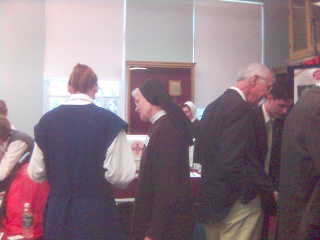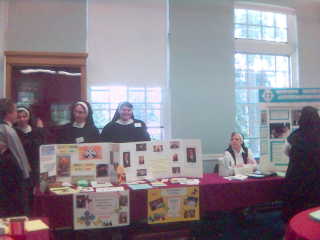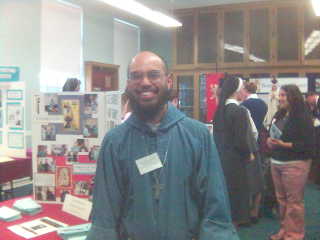
I'm going to post a few pictures soon, but in the meantime wanted to jot down a few notes for everyone but Lauren (who was present). The best part, I thought, was Fr. Groeschel's talk on Friday, even though that ended up occasioning some embarrassment. (The talk was on the general schedule, which failed to note that an extra registration fee was required. Sr. Susan and I were enjoying the talk, but gradually the realization dawned that we were crashing a kind of auxiliary event.)
Fr. Groeschel (he actually prefers to be called "Father Benedict") spoke on "liminality" in religious life and in other off-the-mainstream lifestyles, whether they be radical earth types or Buddhist monks, and he listed the common characteristics of these groups. Among them (my notes are
 downstairs in my backpack) are things like shared possessions, fraternity (i.e., equality of members), simplicity of life and relationships, common dress, and a shared spirit of prayer or (in the case of non-religious liminal groups) a shared sense of the transcendent. He also commented that these groups are NEVER part of the "establishment": it is contrary to their nature! And I suppose it would therefore be harmful to their identity as well. This was especially interesting. Fr. Benedict was treating this really from a sociological standpoint, since it is a sociological phenomenon and is not unique to those seeking to live the Gospel. Society needs people on the margins: it needs a "fringe," but it also needs an established center.
downstairs in my backpack) are things like shared possessions, fraternity (i.e., equality of members), simplicity of life and relationships, common dress, and a shared spirit of prayer or (in the case of non-religious liminal groups) a shared sense of the transcendent. He also commented that these groups are NEVER part of the "establishment": it is contrary to their nature! And I suppose it would therefore be harmful to their identity as well. This was especially interesting. Fr. Benedict was treating this really from a sociological standpoint, since it is a sociological phenomenon and is not unique to those seeking to live the Gospel. Society needs people on the margins: it needs a "fringe," but it also needs an established center.Do you find this interesting and provocative, too?
Okay, and here are a few pictures.


3 comments:
This is quite thoughtprovoking especially given the way many view religious life as part of the establishment of the Church without considering the context of the wider society. In many ways, even within the Church, religious life is not the center but rather at the margins or counter to the establishment when one considers how religious life seeks to rebuild the Church from within (especially communities like Fr. Benedict's whose history and charism are intrinsically linked to rebuilding from within). Others, by their prayer and witness seek to be part of the building up of the Body of Christ both within the Church and in the world.
This definitely gives lots to ponder.
Thanks for sharing it.
I just started reading Patricia Wittberg's book "Pathways for Re-Creating Religious Communities." She makes an interesting point that religious communities are a place where "religious virtuosi" can go. They're people who want something more than what is generally the level of practice of their faith.
Historically, Protestant "religious virtuosi" would break off from their church and start new ones, like the Puritans, etc. They were seeking a more fervent experience of faith.
Catholics have had religious orders for their virtuosi to go to. Wittberg says that even though theologically the Church teaches that all are called to holiness, sociologically these more fervent groups always exist! Part of the crisis in religious life today is that there are more options for the virtuosi than religious life, with new ecclesial movements, etc. So religious orders are "competing" with these other groups for members. There are only so many virtuosi to go around!
Sr. Lorraine, I loved that comment, and now I want to add the book to my growing pile of must-reads. What is interesting, though, is that Fr. Groeschel puts the "liminal" qualities not in a "religious" box, but sees them as a simple human reality. I think many people tend to put a halo around the qualities he listed, and yet they are not of themselves sanctified or sanctifying: they are an expression of a life wholly given over to something other than the "usual." That is what I am especially marveling at.
Post a Comment